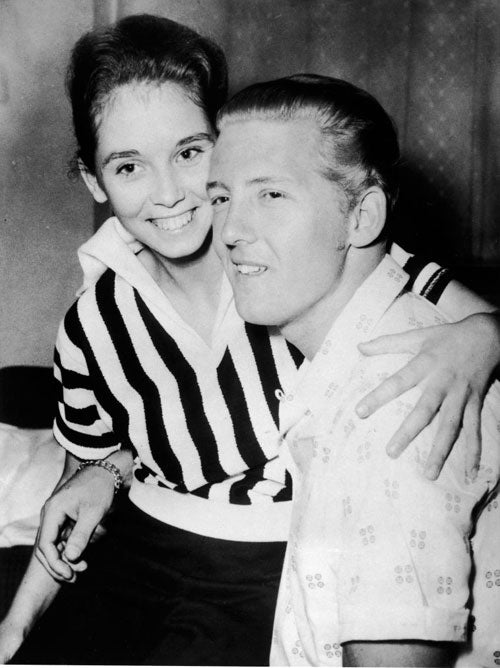There's nothing wrong with cousins getting married, scientists say
Risk of babies having genetic defects 'has been overstated'

The risk of giving birth to babies with genetic defects as a result of marriages between first cousins is no greater than that run by women over 40 who become pregnant, according to two scientists who call for the taboo on first-cousin families to be lifted.
Women in their forties are not made to feel guilty about having babies and the same should apply to cousins who want to marry, said Professor Diane Paul of the University of Massachusetts in Boston and Professor Hamish Spencer of the University of Otago in Dunedin, New Zealand. Although first-cousin marriages are legal in Britain, there have been calls to ban the practice because of reports that it has resulted in a higher-than-average incidence of birth defects in certain immigrant communities where it is common and culturally acceptable.
However, Professors Paul and Spencer said that the risk of congenital defects is about 2 per cent higher than average for babies born to first-cousin marriages – with the infant mortality about 4.4 per cent higher – which is on a par with the risk to babies born to women over 40. "Women over the age of 40 have a similar risk of having children with birth defects and no one is suggesting they should be prevented from reproducing," said Professor Spencer, whose co-authored study is published in the online journal Public Library of Science.
First-cousin marriages were once quite common in Europe, especially among the elite – Charles Darwin married his first cousin Emma Wedgwood – but that changed in the late 19th-century as people, especially women, became more socially mobile and the risks became more evident. The stigma attached to first-cousin marriages was supported by early studies into human genetics suggesting that "recessive" versions of a gene (which are not expressed unless there are two of them, one from each parent) are more likely to be expressed in the children of genetically related parents, as well as more likely to be defective.
Most states in America have either outlawed or restricted the practice, as has China, Taiwan and both North and South Korea. Professor Spencer, an evolutionary zoologist, said these laws should be repealed, especially in America, where he said they were drafted in a way that discriminated against the rural poor and immigrants: "Neither the scientific nor social assumptions behind such legislation stand up to close scrutiny. Such legislation reflects outmoded prejudices about immigrants and the rural poor and relies on over-simplified views of heredity. There is no scientific grounding for it."
In the UK, the issue came to the fore when the MP Phil Woolas, now the Immigration minister, claimed earlier this year that first-cousin marriages within Asian communities in Britain resulted in an increasing number of children with health problems. "A lot of arranged marriages are with first cousins, and that produces lots of genetic problems in terms of disability [in children]," Mr Woolas said.
Peter Corry of St Luke's Hospital in Bradford estimates that among people of Pakistani descent in the city, 55 per cent of whom marry first cousins, the risk of recessive genetic disorders – the type due to related parents – is between 10 and 15 times higher than in the general population. A 2004 study found that 13 out of 1,000 Asian children born in the Bradford area had inherited recessive disorders, which can lead to disabilities.
A family affair: Cousins who tied the knot
Jerry Lee Lewis
The rock 'n 'roll star infamously married his 13-year-old first cousin once removed, 10 years his junior, in 1957. His popularity initially fell but recovered when he began performing country and western music.
Jesse James
The Missouri outlaw married his first cousin Zerelda "Zee" Mimms in 1874 at the height of the James-Younger gang's reign. They had two children and remained together until Jesse's death, aged 34, 12 years later.
H G Wells
The science fiction author of The Time Machine and The War of the Worlds married his first cousin Isabel Mary Wells in 1891 but left her after three years to marry one of his students, with whom he had two children.
Edgar Allan Poe
The American gothic poet secretly married his 13-year-old first cousin, Virginia Eliza Clemm, in 1834. She died of tuberculosis in 1847.
Johann Sebastian Bach
In 1707 Bach married his second cousin Maria Barbara Bach and had seven of his 20 children with her.
Khalid Mahmood
The Birmingham MP married his first cousin, Rifat, when he was in his twenties. They had a child – now a teenager – but separated in 1992.
Charles Darwin
The naturalist, whose work forms the basis for contemporary evolutionary theory, married his first cousin Emma Wedgwood in 1839. They had 10 children, to whom he was a devoted father.
Join our commenting forum
Join thought-provoking conversations, follow other Independent readers and see their replies
Comments
Bookmark popover
Removed from bookmarks